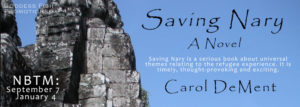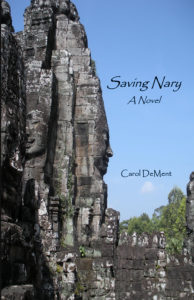Saving Nary: Carol DeMent
Please welcome Carol DeMent author of Saving Nary.
Carol DeMent author of Saving Nary will be awarding $10 Amazon/BN GC to a randomly drawn winner via rafflecopter during the tour.

Saving Nary
by Carol DeMent
~~~~~~~~~~~~~
GENRE: Fictional
~~~~~~~~~~~~~
Interview: Saving Nary
- What or who inspired you to start writing?
I was given a diary by my folks when I was in fourth grade. And reading was a big part of my life for as long as I can remember. It was in college, however, when I wrote an 80-
page research paper about the Prohibition Movement using a system of index cards to organize my data that I realized I might have the tenacity to write actual novels.
- How did you come up with ideas for your books?
What expertise did you bring to your writing?
Generally, the idea for a story begins with my own experience of something that I am passionate about. The seed germinates and I start to toy with various story lines, and then I start doing research to see if what I am imagining would have been possible within the setting I envision. Since my novels are based on historical events, I am meticulous about this initial research and my findings will shape the story I go on to develop.
- What would you want your readers to know about you that might not be in your bio?
I love hearing what readers take away from a novel I have written. I have gone as a guest author to many book groups whose members have read Saving Nary, and the insights that readers share with me are always illuminating.
- As far as your writing goes, what are your future plans?
I am working on researching and developing my second novel, set in Montana in the late 1800s. What I can say with certainty is that the theme that will pervade all my novels is that of cross-cultural interaction. I love to explore the ragged edges where two cultures meet and intermingle, sometimes harmoniously, sometimes explosively. My second novel will examine the impact of the Chinese immigrants who entered the country to work the mines and railroads.
- If you could be one of the characters from any of your books, who would it be and why?
That is a tough question, because the main characters in Saving Nary are Cambodian refugees who have all survived tremendous trauma inflicted on them by the Khmer Rouge. Nonetheless, I would choose Nary, because she is surrounded by adults who love her and because she is the youngest and carries the hope for a bright future ahead of her.
- Do you belong to a critique group? If so how does this help or hinder your writing?
Yes, I belong to the Puget Sound Writer’s Guild and it has been exceptionally helpful in creating novels that are tightly written, sufficiently dramatic and well-rendered. Each member tends to have a certain focus area, for example chapter structure, credibility of the story line, characterization, sense of setting and so forth. Plus, they catch the silly mistakes every author makes, like a miraculous change in the protagonist’s eye color between chapter one and chapter six!
- When did you first decide to submit your work? Please tell us what or who encouraged you to take this big step?
I always intended to publish Saving Nary, because I wrote it in part to bear witness to the tragedy that occurred in Cambodia. In many respects, this is a situation that has been swept under the carpet, a poor cousin to the Vietnam War, when in fact the two are integrally connected. The rise of the Khmer Rouge and the subsequent devastation of Cambodia contains a lot of lessons for us all, not the least of which is the resiliency of the human spirit. Of course, positive feedback from beta readers and my writing group provided additional encouragement.
- What is the best and worst advice you ever received? (regarding writing or publishing)
The worst advice was, “You’ll never find a publicist.” This was from a publicist I had queried who declined to work with me. She was wrong. The best advice I heard, and I heard it from more than one source, was “Believe in your book.”
- Do you outline your books or just start writing?
I outline first, with three or four sentences describing each chapter. I use this as my guide to staying on track as I write the story, but I make revisions as I go, building complexity and subplots into the story, determining narrative voice and so forth. And sometimes, the characters just take matters into their own hands and do something unexpected, unplanned, but just right. That is the magic of writing a novel.
- Do you have any hobbies and does the knowledge you’ve gained from these carry over into your characters or the plot of your books?
Definitely, yes. I was a volunteer English-as-a-Second Language tutor in the early 1980s working with Vietnamese and Cambodian refugees, and later worked at a Refugee Center, so these experiences gave me direct experience to draw on as I wrote Saving Nary. For the last twenty years, I have been an acupuncturist and practitioner of Chinese herbal medicine, and these areas of expertise will figure prominently in my second novel. As they say, write about what you know…

BLURB: Saving Nary
A Finalist in the 2017 Next Generation Indie Book Awards, Saving Nary explores the losses, loyalties and secrets held within families broken by war and genocide. This compelling novel presents a palette of unique characters who struggle to make sense of the events that led them to America, even as they ponder the bewildering culture and lifestyle of their new homeland.
Refugee Khath Sophal lost everything when the Khmer Rouge swept into power in Cambodia: his livelihood gone, his family dead or missing; his sanity barely intact from the brutality he has been forced to witness.
Now resettled in the Pacific Northwest, Khath treads a narrow path between the horrors of his past and the uncertainties of the present. His nights are filled with twisted dreams of torture and death. By day he must guard constantly against the flashbacks triggered by the simple acts of daily living, made strange in a culture he does not understand.
Then Khath meets Nary, a mysterious and troubled Cambodian girl whose presence is both an aching reminder of the daughters he has lost, and living proof that his girls, too, could still be alive. Nary’s mother Phally, however, is another matter. A terrible suspicion grows in Khath’s mind that Phally is not who or what she claims to be. A split develops in the community between those who believe Phally and those who believe Khath. And those, it seems, who don’t really care who is right but just want to stir up trouble for their own personal gain.
Khath’s search for the truth leads him to the brink of the brutality he so despises in the Khmer Rouge. His struggle to wrest a confession from Phally ultimately forces him to face his own past and unravel the mystery of his missing daughters.
~~~~~~~~~~~~~
EXCERPT: Saving Nary
As the sun rose, Khath sat cross-legged in a lotus position in the small Buddhist temple nestled below Khao I Dang Mountain. The barbed wire perimeter fence separated the mountain from the refugee camp, but the mountain lent its power to the area nonetheless. Pra Chhay and two other monks chanted the Heart Sutra, a prayer of enlightenment, the rhythmic drone rising and falling in a soothing and familiar hum as the scent of incense hung heavily in the hot, humid air. About thirty refugees sat on the straw mats covering the wooden floor of the bamboo temple. The lips of many were moving as they softly chanted along with the monks.
Khath’s lips remained still, his heart empty. If asked, he would not disavow the teachings. He believed the teachings, yet the words of the Buddha had lost the power to move or to comfort him. He felt somehow distant from the teachings, as though they controlled behavior on a different world from the one he inhabited. It was a very lonely feeling.
The monks chanted on, a background hum that began to irritate Khath. He might as well be listening to the drone of mosquitoes as he toiled on the dikes under the watchful eyes of the Khmer Rouge, their guns aimed and ready, afraid to brush the insects away from his face lest he be beaten for not putting full attention into his work.
Observing the others in the temple, Khath envied them their faith. Pra Chhay often said there were two levels of Buddhism, one being the simple devotions taught to uneducated villagers; the other consisting of the higher practices and theories studied by the scholar monks.
~~~~~~~~~~~~~
AUTHOR Bio and Links:
Carol DeMent worked in the field of South East Asian refugee resettlement for seven years, and completed master’s level research into international refugee resettlement policy. She lived for two years in Thailand as a Peace Corps volunteer and has traveled extensively in South East Asia. Her first novel, Saving Nary, was a Finalist in the 2017 Next Generation Indie Book Awards.
https://www.amazon.com/Saving-Nary-Carol-DeMent/dp/1522982906 https://www.amazon.com/Carol-DeMent/e/B01CRJ1EVA
https://www.goodreads.com/author/show/15089080.Carol_DeMent
~~~~~~~~~~~~~
GIVEAWAY INFORMATION and RAFFLECOPTER CODE
Carol DeMent will be awarding $10 Amazon/BN GC to a randomly drawn winner via rafflecopter during the tour.
RAFFLECOPTER CODE:
<http://www.rafflecopter.com/rafl/display/28e4345f2403



Thanks for hosting!
congrats on the tour and thanks for the chance to win 🙂
Welcome to my blog. I hope you have a great tour.
Thank you for the chance to “talk” to your readers!
Really great post, thanks for sharing 🙂
Glad you enjoyed it!
Thanks for the chance to win and good luck with the book tour!
What is the best book that you have read in the past year? Thanks for the giveaway. I hope that I win.
For a whimsical read with a bit of mystery and a dash of romance, I enjoyed “The Night Circus” by Erin Morgenstern. A little different from what I normally go for but it’s good to mix things up now and then, right?
Hope you are having a fabulous weekend! Looking forward to checking out this book!
All weekends are fabulous. ☺